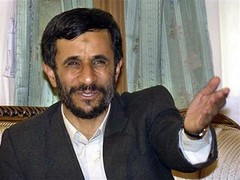Why the Iranian Election Results Are Good News
I’m feeling optimistic today because the hardest-line of two hard-line candidates (the one wanted for murder in more countries than the other) prevailed in the patent sham that the Iranian mullahs call an “election.” Having said that, I suppose I should explain myself.
Does anyone really still believe that any candidate the Guardian Council would have allowed onto the Iranian ballot was amenable to real reform? That should have been the lesson of the Khatami presidency, which proved itself both insincere about reform and powerless to make even cosmetic changes without the interference of the mullahs and their vetoes. Ditto any diplomatic resolution of Iran’s nuclear ambitions.
 Having abandoned hope of peaceful reform–as has the majority of the Iranian people, if recent reports are to be believed–the real hope for Iran lies in a Tehran Spring, a Peacock Revolution. The basis for that hope is contingent on reports, mostly from bloggers via contacts with the Iranian opposition, that the turnout and ballot results were nothing like the official announcements.
Having abandoned hope of peaceful reform–as has the majority of the Iranian people, if recent reports are to be believed–the real hope for Iran lies in a Tehran Spring, a Peacock Revolution. The basis for that hope is contingent on reports, mostly from bloggers via contacts with the Iranian opposition, that the turnout and ballot results were nothing like the official announcements.
I know enough about the biases of some reporters working in that region to doubt them; on the other hand, I simply don’t know enough to know if it’s really Dr. Zin and Michael Ledeen who have it right. Because I tend to agree with their outlook, I’m on guard against wrapping myself into an ideological cocoon. What Dr. Zin has on his side is some photographic evidence, which I’d call persuasive, although not conclusive. They report that the turnout figures are attributable to the hardest-line mullahs stamping out several fake ID cards for each reliable thug they control, and ordering them all to vote half a dozen or more times. That can be an effective tactic when most voters are boycotting the polls.
Accepting for the sake of discussion that the great majority of Iranians–and demographically, Iranians are very young–want a reformed, free society, then the rise of Mahmoud Ahmadinejad may be just the catayst that’s needed to transform their alienation into desperation and action. Rafsanjani, as insincere and corrupt as he may be, had been promising better relations with the West, and might have cultivated some hope that patience would be rewarded with a relaxation of the state’s grip. Not so with Ahmadinejad, who seems poised to pull a black chador over the sky itself.
Another tantalizing development is Michael Ledeen’s suggestion that the Iranian regime itself is split, and that we are seeing an electoral coup by the Revolutionary Guards, the Basij, and other supporters of Ahmadinejad. Ahmadinejad is also wanted for murder in both Germany and Austria, so we can pretty much rule out an international “charm offensive.”
Now it remains to be seen just how the people of Iran really feel about their new overlord, and whether they have the will and the means to take to the streets and hold them. It’s a sad state we find ourselves in that our news media uncritically accept the statistics put out by a tyrannical regime, leaving us essentially uninformed. But if there is some reasonable chance that the people of Iran are collectively waiting for the spark, this is probably the best spark we’re going to see. The Iranian people need our encouragement.